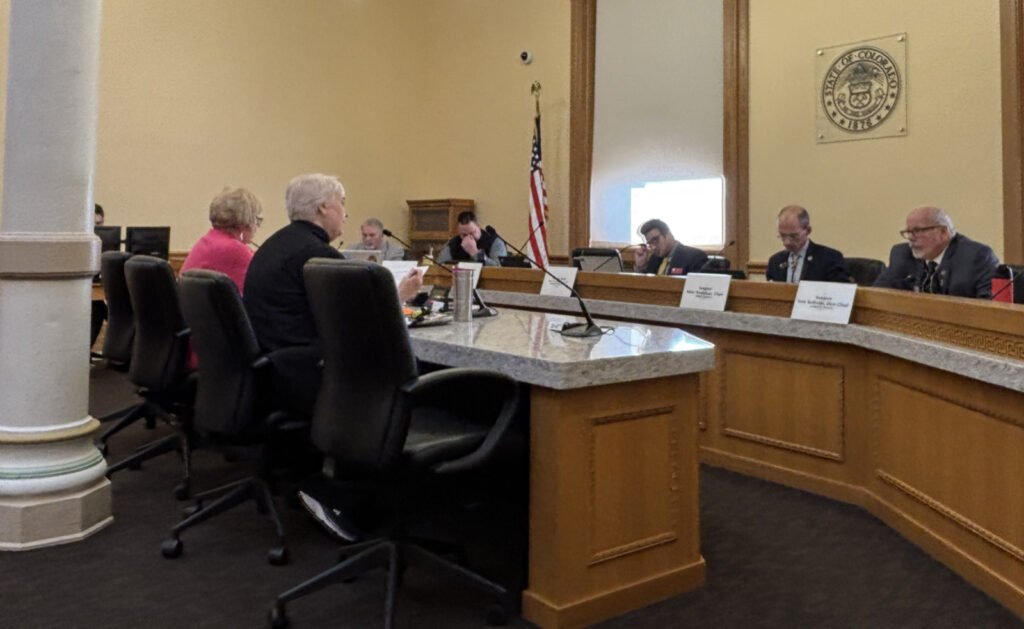Update: SB 25-077 passed the Colorado Senate 27-6 on Wednesday, Feb. 26.
By Jeffrey A. Roberts
CFOIC Executive Director
A bill that extends Colorado Open Records Act response times for public and commercial requesters won the support of a state Senate committee Thursday.
Senate Bill 25-077 gives government records custodians five working days, rather than three, to fulfill CORA requests and an additional 10 working days, rather than seven, if “extenuating circumstances” exist. If a request is determined to be “for the direct solicitation of business for pecuniary gain,” governments can charge “the reasonable cost” associated with fulfilling the request — rather than the maximum hourly rate in CORA — and take up to 30 working days to do so.
Records custodians are “essentially drowning in CORA requests, and this just provides that little bit of relief,” said Sen. Cathy Kipp, the Fort Collins Democrat who introduced the bill with Sen. Janice Rich, a Grand Junction Republican. “It’s not solving the problem, but I think it will help.”

The measure also lets governments treat multiple requests — “pertaining to facially similar content” made by the same person within 14 days — as one request, ensuring the requester gets only one free hour before research-and-retrieval charges kick in.
Journalists, as defined by Colorado’s reporter’s shield law, would not be affected by the longer response times or the provision regarding multiple requests made within 14 days.
Representatives of several government entities and associations testified in favor of the bill in a Senate State, Veterans & Military Affairs Committee hearing.
Kym Sorrells, county attorney for Jefferson County, told committee members the county received 650 CORA requests in 2024 compared with 217 in 2019.
“Our residents are really active, and that’s great. They want to be involved in government, and they’re entitled to these documents. We don’t deny that,” she said. “I just want to share with you the impact that it has on our county operations when we have to respond to this number of or requests.” Sorrells said her office received 38 requests in December, including one that took 144 hours to fulfill. “It was physically impossible for our team … to respond within that (CORA) time frame.”
But Elizabeth resident Jessica Capsel testified that the bill “imposes unnecessary restrictions on the CORA process and places an undue burden on citizens while granting more power to government entities.” She criticized the multiple-requests-within-14-days provision and another allowing for extra time if a records custodian is not scheduled to work within the normal response period.
“I wish, instead of creating more CORA laws aimed at reducing citizens access to information, the legislature would focus on laws that make information more accessible so the CORA process isn’t necessary at all,” Capsel said.
The Colorado Freedom of Information Coalition pointed out that CORA fees already are a significant barrier to obtaining public records in Colorado, with the maximum hourly research-and-retrieval rate now at $41.37. CFOIC has counted nearly 1,500 cities, towns, counties, state agencies, special districts, school districts and public universities that have raised their rates since July 1, 2024.
“People have little or no power when their request for records is delayed. They don’t file lawsuits over delayed responses because of the time it takes to resolve a lawsuit,” CFOIC executive director Jeff Roberts testified. Whether requesters can challenge CORA response delays in court may be in question given a recent Colorado Court of Appeals opinion that the Colorado judiciary can’t be sued for delaying its response to a request for administrative records — if the records eventually are provided to the requester. Although the ruling concerned the judicial branch’s records rules, not CORA, both have similar language regarding the right to sue in district court.
SB 25-077 contains some provisions that would benefit records requesters.
It requires government entities to post on their websites rules and policies about how to make CORA requests as well as their records retention policies. If a requester asks, a custodian must provide “a reasonable break-down of costs that comprises the fee charged for research and retrieval of public records.”
The bill also clarifies that a government entity must allow electronic payments for public records if that government entity lets the public pay for services or products electronically. Some governments still require requesters to write paper checks for public records, interpreting a 2023 CORA amendment to mean that records custodians don’t have to accept credit cards if that designated person doesn’t take credit cards for other services or products.
The state affairs committee sent SB 25-077 to the Senate floor on a 4-1 vote. Sen. Byron Pelton, R-Sterling, said he voted against the bill primarily because it differentiates between the public and news media.
“I feel like these are the peoples’ records and the media should not have a special carve out in this bill,” he said. Pelton is the Senate sponsor of a House bill that addresses multiple government transparency issues, including fees for public records and Colorado Open Meetings Law exemptions for the General Assembly enacted in 2024.
Follow the Colorado Freedom of Information Coalition on X or BlueSky. Like CFOIC’s Facebook page. Do you appreciate the information and resources provided by CFOIC? Please consider making a tax-deductible donation.




